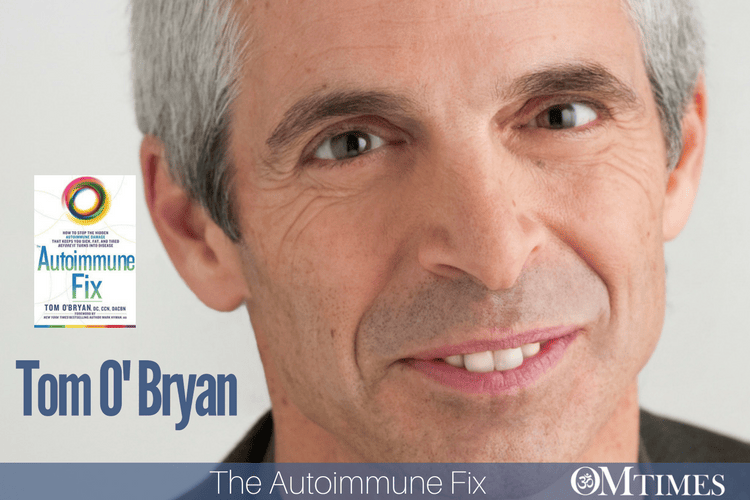Tom O’Bryan: The Autoimmune Fix

Tom O’Bryan: We have found this has worked so many times. When people can’t afford to do the test or, for whatever reason, their doctor won’t do it for them, the recommendation for three weeks, eat all the vegetables you want. Eat all the quality meats that you want, no lunch meat, no inexpensive meats, and eat rice and Quinoa, maybe amaranth, some grains, but don’t eat any wheat, no wheat at all, none, and no dairy, and no sugar, three weeks. Just give it three weeks and notice what happens to your body and how you feel.
People are blown away when, all of a sudden, You just notice that all of a sudden, you’re feeling so much better. And when people do this, and then they go out and have a pizza, they come in and say, oh, doc, I felt so sick the next day. I say, good, good, no one can argue with you when you feel that sick, good for you.
But, you can’t tell that food’s bad for you when you’re eating it all the time unless it gives you stomach pain. Those are the lucky ones. If it gives you brain fog or thyroid problems or muscle aches or lack of energy, you can’t tell it’s the food you ate last night that’s doing that to you. That’s why give it three weeks – no wheat, no dairy, no sugar for three weeks. Eat everything else you want, but none of those, and just notice how you feel.
What you put in your mouth determines how you function. The smartest thing you could do is make sure that what’s on the end of your fork is actually healthy for you. But, it takes a little bit of study to figure out what’s healthy for you and what’s not. You can’t blindly go along anymore and believe what they tell you on television.
Miriam Knight: Tom O’Bryan, Can you tell us the connection between weight and toxicity?
Tom O’Bryan: Yes, of course. When we’re exposed to toxic chemicals, our body has a defense mechanism that tries to isolate those chemicals and keep them out of the bloodstream and out of circulation. Why? To protect the brain because 20 to 25 percent of all the blood’s in the brain at any one time, and it’s very, very sensitive tissue.
So, we store these toxic chemicals in our body. Where do we store them? In our fat cells. That’s where most them are stored – also in the bone, but mainly in the fat cells. So, your fat cells start to swell. They swell with all these, they’re called endocrine disrupting chemicals. Endocrine means hormone – so these hormones disrupting chemicals. So, you’re disrupting your thyroid function. You’re disrupting your testosterone male function. You’re disrupting your estrogen-progesterone female function because these toxic chemicals get into the cells, and then the body holds more water, the fat cells swell, they swell, and so you gain weight. And when people start to detox, if they do it properly, the result does not only do they feel better and think better and function better, but they lose weight. That’s why my friend Dr. Bill Davis wrote this great book called Wheat Belly some years ago, and he talked about the tremendous amount of weight loss that occurs for most people when they got wheat free. It doesn’t mean mostly wheat free. Going wheat free means going wheat free, no cheating. And when you do that, many, many people will shed 10 pounds, 15 pounds in a month without counting calories because they’re still eating a lot of food. But, they just start shedding some of these toxins. The fat cells start flushing, flushing out some of the toxins.
Miriam Knight: I thought it was important that you pointed out the necessity to drink a lot of water, that that’s the easiest way to get rid of the toxins without having an adverse reaction.
Tom O’Bryan: Oh, it’s a critical first step, it’s critical. You cannot start detoxing until you’re able to eliminate properly. Because when you start mobilizing all of these toxins onto your cells, if you have average or less than average bowel movements, or you don’t drink enough water, you’re not urinating often enough, all these toxins that have been in storage are now in the bloodstream, you will get really sick. You have to make sure that your bowels are working really well first and that you’re drinking plenty of water. It’s about somewhere between–somewhere about a half ounce of water per pound body weight. So, I weigh 180. That’s 90 ounces of water a day, 90, nine-zero. So, if you weigh 120, that’s 60 ounces of water a day. It’s almost a gallon every day without exception, every day. And most of us don’t do that, and so we’re stagnant. It’s like things aren’t moving very well.
And just like a stream, if it’s a fast-flowing stream, the water tends to be a little bit clearer than if it’s slow, barely moving, stagnant stream. And that’s the way our bloodstream is. You’ve got to keep things moving. So, you have to have enough liquid for that to occur, and Coca-Cola doesn’t do it, lemonade won’t do it, ice tea won’t do it. It’s got to be water, pure water, the cleanest water that you can get your hands on.
Miriam Knight: I want to point out to our listeners that eliminating sugar also means eliminating sugar substitutes. Tell us why.
Tom O’Bryan: Oh, my goodness, the sugar substitutes are much, much worse. If you’re gonna eat sugar, eat sugar. I don’t think you should, but if you are gonna eat sweets, eat sugar because the sugar substitutes disrupt your microbiome. They completely change the microbiome to a non-healthy, fat storing, increase weight microbiome. So, these sugar-free substitutes, the sugar-free pops, the sugar-free desserts and all of that, people gain weight, and it’s because they’ve disrupted their microbiome. The good bacteria in their gut have been destroyed, and more of the bad bacteria that store calories, more of that bacteria starts to develop. The classic example is the Pima Indians. For hundreds of years, maybe thousands of years, they’ve lived in the desert area in the four corners of the Southwest and down into Mexico, you can’t grow stuff there. So, what did they eat? They ate whatever they could catch and, whatever they could harvest from cactus and things, some roots maybe. But, it’s not a lush tropical area or a lush area with good soil to grow crops. They had very little to eat. So, those people that did not have efficient storage of calories, they died. And when they die off, they don’t reproduce. But, those whose bodies had efficient storage of calories with what little they could find to eat, their bodies were more efficient at storing those calories, they reproduced. And so, they survived, they reproduced, and in their environment, they thrived.
Now, how is it that you are efficient at storing calories? It’s the microbiome. It’s the bacteria in your gut. And if you have too much of the bacteria called Firmicutes, you will store lots and lots of calories. And the Pima Indians have high ratios of Firmicutes in the bacteria of their gut. It saved their culture. It saved their lives. They developed it generation after generation, they became more efficient at using calories and storing calories. It’s a survival mechanism for them.
Now let’s fast forward to the 1930s, the 1940s. Now the Pima Indians are living on reservations, eating the food that the Bureau of Land Management’s giving them, all the canned stuff and the garbage foods, and what’s the result? Today, 50 percent of Pima Indians are morbidly obese and have type II diabetes by the age of 35, 50% of them. Now they’re eating high calorie, low nutrient density food. They’re eating the garbage that everybody else eats.
Miriam Knight: You also pointed out the importance of probiotics and probiotics. Go a little more into the nature of the microbiome.
Tom O’Bryan: What’s most important in our gut is the diversity of bacteria, all the different thousands of families of bacteria that are supposed to be there. For every message from the brain going down to the gut, there are nine messages from the gut going up to the brain. And the messages from the gut going up to the brain are from the microbiome, the bacteria in your gut.
They actually control how much brain hormone called neurotransmitters you make, how much serotonin, how much melatonin, how much norepinephrine. That’s controlled, the term is modulated by the microbiome.
So, there are thousands of families of bacteria in our gut.Now, back in the 1980s, 1970s, 1980s, we knew that if you take probiotics, the good bacteria, if you take it, it seemed to help, and people got healthier, and that’s true. But, we now know that it’s not any one particular type of probiotic that’s important. It’s the diversity of probiotics that are most important. You want the whole family because of some probiotics in your gut, the good bacteria in your gut control how your heart functions. Other bacteria control how your lungs function. Other bacteria control how your brain functions.
Click HERE to read Page 4 of the Interview with Tom O’Bryan
OMTimes Magazine is one of the leading on-line content providers of positivity, wellness and personal empowerment. OMTimes Magazine - Co-Creating a More Conscious Reality





